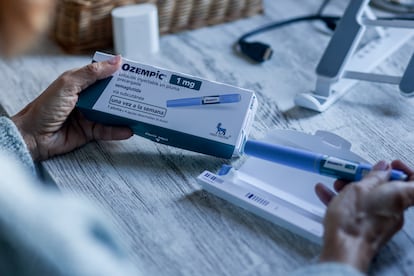New anti-obesity pills threaten Eli Lilly and Novo Nordisk’s stock market empire
As more pharmaceutical companies make inroads in the weight loss market, the two firms saw their shares fall more than 10% in the last month

New pills to combat obesity are threatening Eli Lilly and Novo Nordisk on the stock market. The two pharmaceutical companies are the dominant players in the weight loss market, since (for the time being) they are the only ones producing and marketing anti-obesity drugs. However, this is a very greedy business and in recent months other laboratories, attracted by this millionaire empire, have made progress with their own drugs, arousing the interest of the market and sparking doubts about the empire of the two giants, which have seen shares fall.
Last week, Viking Therapeutics presented the latest results of its anti-obesity drug. It is an injection that is in the final stages of study. It also announced that it is working on an oral version, which is currently in a mid-stage trial. After presenting the results of its anti-obesity drug, the company’s shares soared 39% in a single day. So far this year, its stocks have risen by 235%.
Similarly, Roche — which had previously announced that it was working on an oral weight-loss drug — said last week that it had accelerated its launch, following promising results from its experimental study. The company’s shares are up 13% so far this year, but that rise is really due to the breakthrough in the last two weeks after it revealed its plans for an anti-obesity pill.
“Diabetes and obesity continue to dominate the healthcare sector. Goldman Sachs estimates that the market will grow from $14 billion in 2024 to more than $130 billion by 2030. Understandably, many pharmaceutical companies are conducting research in this area,” says Sebastian Hofbeck, analyst at DJE Kapital.
In addition to Viking and Roche, Danish biotech Zealand Pharma and German drugmaker Boehringer Ingelheim are jointly developing a similar drug. Terns Pharmaceuticals is investigating an oral anti-obesity drug, and expects to report its results in the second half of the year. Altimmune is also testing an injectable drug. Meanwhile, Pfizer has dropped two pills it had been working on due to the strong side effects detected at the intermediate stage, but the lab is willing to “play and win” in the weight-loss drug market. According to Bloomberg’s calculations, positive results in studies to develop an anti-obesity drug have driven $93 billion in market gains for companies so far this year.
The World Health Organization (WHO) describes obesity as “a global crisis.” According to the institution, one in eight people in the world were living with obesity in 2022. Amid the rise of the disease, Novo Nordisk and Eli Lilly were the first companies to develop and market products that help treat obesity, which have brought them millions of dollars in stock market profits. But after the emergence of new competitors, their shares have suffered in recent weeks.
Novo Nordisk markets two drugs. On the one hand, it produces Ozempic. This is a drug initially developed to treat diabetes, but among its effects, it reduces appetite and slows digestion, thus helping to reduce weight. On the other hand, it also produces Wegovy, a drug that shares the same active ingredient as Ozempic. Both have propelled Novo Nordisk to become Europe’s most valuable company, with a market capitalization of more than $570 billion. So far this year it is up 64%, but in the last month it fell 11%.
Eli Lilly markets Mounjarro and Zepbound, a drug approved in November last year for obese or overweight patients suffering from complications such as hypertension, Type 2 diabetes, cholesterol, obstructive sleep apnea or cardiovascular disease. The company expects Zepbound to become the best-selling drug in history. The firm is up 32% on the stock market so far this year, but in the last month its shares also dropped 14% due to competition that is threatening to break its duopoly with Novo Nordisk.
“The main beneficiaries of the anti-obesity drug market remain Eli Lilly and Novo Nordisk, which are the only companies already marketing their Zepbound and Wegovy products and will remain alone in this market for a few more years, as potential competitors are only in the early stages of research,” explains Sebastian Hofbeck.
Until now, the biggest challenge facing Novo Nordisk and Eli Lilly was meeting the huge demand. The weight loss market is gigantic. The WHO estimates that 43% of adults worldwide are overweight and 16% obese. In Western countries, the rates are higher (in the U.S. this figure is estimated at 70%). “The biggest challenge for the two companies remains being able to meet this huge demand. To this end, Eli Lilly and Novo Nordisk are investing a lot of money in production capacities and in acquiring other companies. It remains to be seen whether these investments will be enough. According to both companies, it will be years before they will be able to meet all the demand,” says Hofbeck.
Sign up for our weekly newsletter to get more English-language news coverage from EL PAÍS USA Edition
Tu suscripción se está usando en otro dispositivo
¿Quieres añadir otro usuario a tu suscripción?
Si continúas leyendo en este dispositivo, no se podrá leer en el otro.
FlechaTu suscripción se está usando en otro dispositivo y solo puedes acceder a EL PAÍS desde un dispositivo a la vez.
Si quieres compartir tu cuenta, cambia tu suscripción a la modalidad Premium, así podrás añadir otro usuario. Cada uno accederá con su propia cuenta de email, lo que os permitirá personalizar vuestra experiencia en EL PAÍS.
¿Tienes una suscripción de empresa? Accede aquí para contratar más cuentas.
En el caso de no saber quién está usando tu cuenta, te recomendamos cambiar tu contraseña aquí.
Si decides continuar compartiendo tu cuenta, este mensaje se mostrará en tu dispositivo y en el de la otra persona que está usando tu cuenta de forma indefinida, afectando a tu experiencia de lectura. Puedes consultar aquí los términos y condiciones de la suscripción digital.









































